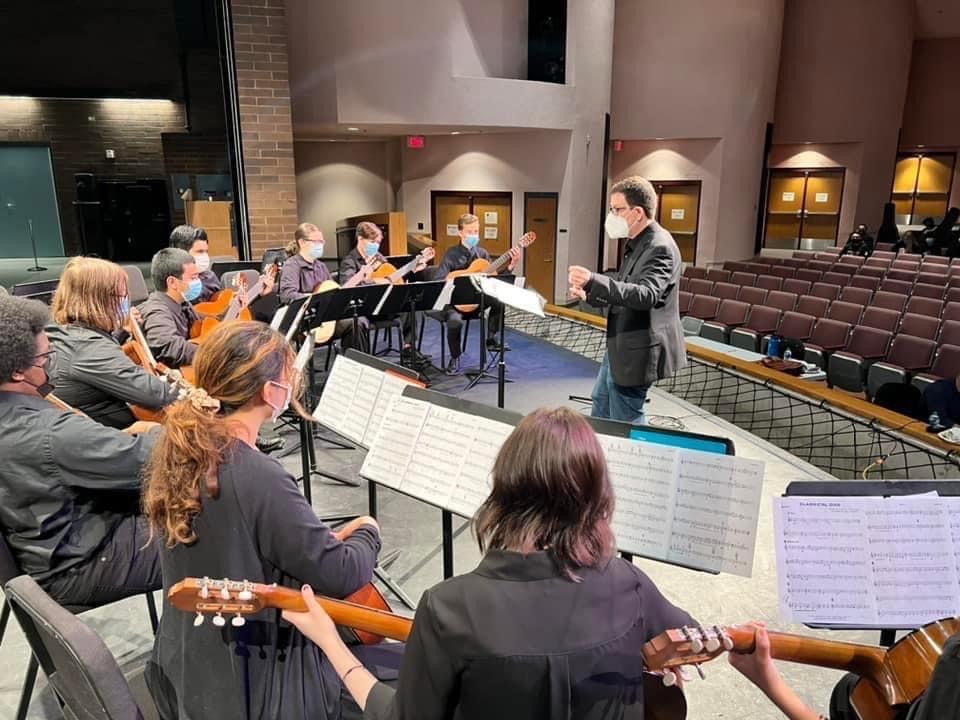Orchestra
The concert orchestra is open to all students and is the entry-level orchestra. The symphonic orchestra is a little more advanced. The chamber orchestra is the most-advanced of the 3 orchestras.
Both the symphonic and chamber orchestras require auditions with the Director.
Donate to Sahuaro's Orchestra by donating tax credit.
Bring in baked goodies for the bake sale before a concert at the table near the entrance door. If time is an issue, students can donate to the "Feed the Cougar" jar during class or stop by our bake sale table during all our concerts!
Provide supplies such as rosin, chin rest, or to just donate $5-$20 to help our Orchestra, please reach out to Mr. Schmidgall.
Join the Sahuaro Orchestra Parents Association (SOPA). They assist the orchestras do fundraising events and chaperone. The monies raised in fundraising events help pay for instrument repairs, private lessons, etc... They hold meetings one Tuesday of every month. All are welcome.
Mr. Schmidgall
(520) 731-7314
Email Mr. Schmidgall
Philip Hemmo (Guitar Teacher) is known throughout the United States as a teacher, composer, and performer of the classical guitar. As a faculty member at the University of Arizona, Pima Community College, the University of Illinois, Springfield, Notre Dame Preparatory High School, Northern Arizona University, and now Sahuaro High School, he continues to foster the next generation of guitarists.

All students who compete or engage in activities that are considered extracurricular must meet all eligibility and grade requirements as defined by TUSD and AMEA. Please become familiar with the policy explained in the Sahuaro Student Handbook. Scholarships for students paying fees may be available through the school or the Educational Enrichment Fund. No student is denied access to any class or activity due to financial hardship. Extracurricular events include, but are not limited to, events listed on the AMEA/ABODA competitive calendar (such as regional and state music festivals) and all other events where a rating is awarded. Students in the Sahuaro Orchestras will compete in extracurricular activities; orchestra is therefore considered co-curricular and requires a participation fee. The participation fee is considered a tax credit donation and can be written off on your taxes next year as part of your total.
GRADES
Grades are based on:
- Orchestra Rehearsals (on time, with instrument, with music, ready to play, good behavior, participation, playing tests, written theory tests, etc.)
- Playing Tests
- Assignments (written theory assignments and tests, documents home for signatures, practice card, etc.)
- Concert and Festival Participation
REHEARSALS
Rehearsing happens in class; practicing happens outside of class. You are expected to know your part. Many students spend a lot of time practicing, but do not see improvement. Using your practice time wisely and efficiently will increase your ability and musicality. We will go over strategies for making the most out of your practice time outside of class. In class, we will work on musical aspects like dynamics, phrasing, contour, style, ensemble, balance, blend, etc.
Please have a pencil, rosin, endpin rest (cello/bass), music, shoulder pad (violin/viola) and whatever else is necessary for the rehearsal to be productive. Cell phones and pagers are not to be used during class. The downbeat for the first warm-up will be 2 minutes after the bell rings. Unnecessary talking will distract us from our goal. Raise your hand if you have a question or comment. Do not talk over anyone else. Sit or stand with good posture. Please be respectful to others and to the group as a whole so that we can ensure a positive and rewarding time together.
ABSENCES
Students can make up missed points for an excused absence. Points missed because of an unexcused absence will receive 80% of the total possible points if the work is made up the day the student returns. Class absences are excused through the attendance office. Absences for performances/events outside of class time may be excused on a case by case basis (at the orchestra director’s discretion) with a note written and signed by the parent/guardian at least 2 weeks prior to the event. It is the student’s responsibility to ask the director what assignment(s) can be done to make up missed points.
TARDIES
You are on time if you are in class when the bell rings AND you are in your seat with your instrument 2 minutes after the bell. These two minutes will be used for getting your instrument/music/pencil, for rosining and getting adjusted. This time goes quickly. Late passes must be signed by a teacher or an administrator with the departure time from that person. Tuning and warm-ups promptly begin 2 minutes after the bell. There is obviously no talking during tuning, warm-ups or rehearsal.
For performances and other events, students must check in with the director or designated person before the call time. Please inform me if you know you will be late to a performance using a note describing why you will be late signed by your parent/guardian as soon as possible. An unexcused tardy to a performance will automatically lower your grade to 70% of the points given for that function. Depending on the circumstances, more points may be taken away.
Attendance and tardy problems can affect your grade, seating, performance participation points, awards and trip privileges. As the old adage goes, “To be early is to be on time. To be on time is to be late. To be late is to be dead.”
MUSIC CHECKS
Music checks are playing tests that may take various forms. Some will be announced a week in advance while others may be “pop” music checks. Some will be done in front of the whole orchestra, some will be with your section (or section leader) only, and some will be tape recorded on audio tape. They will be graded on a pass/fail basis. If you pass, you earn 100 points. If you fail you earn zero. One week later, you may retake the test and earn 50 of the 100 points back if you pass. It is imperative that you know your music. Remember, rehearsal is for putting practiced music together with your ensemble.
SOCIAL MEDIA AND TEXTING
At the discretion of the orchestra director, a student who writes a negative or condescending post, text, etc, about other people will be removed from the orchestra program. If it is not possible to remove the student because the offending post is written at a time in the semester when it is impossible to switch schedules, the offending student will be given written music assignments and will be removed from the program at the earliest possible opportunity. As a program, we will do our best to be as inclusive, open, friendly, caring and positive as possible.
PRACTICE RECORDS AND PRIVATE LESSONS
Practicing is a major determining factor of the orchestra’s level of musicality. You must practice at least 2 hours per week (18 hours per quarter) and document it on the official practice record contained in this handbook. Those who do (and complete the other requirements), usually receive an “A”. Those who do not will not receive a grade higher than a “B”, even if that student’s points tally up to what would be considered an “A”. All practice records must me completed on the official form. Parent and student signatures are required. Forms will be provided.
If you are taking private lessons, you may fill out the private lesson verification form in lieu of a practice record. This form is also included in this handbook. Parent, student, and private teacher’s signatures are required for this option. This form must be filled out each quarter to ensure that a student receives all 300 points. Once again, if one of these two forms is not turned in, the quarter or semester grade will be no higher than a “B”.
INSTRUMENTS
If you are using an instrument that belongs to the school, you may not take it home unless you have filled out an instrument request form. Whether you own, borrow, or rent your instrument, you are responsible for keeping it in good playing condition. Please loosen your bow and dust the rosin off of your instrument every time you put your instrument away. Your instrument case must be labeled with your name. If you are borrowing a school instrument and it needs repair, let me know as soon as possible so I can take care of it. If a school instrument is damaged due to negligence or vandalism, the student who has the instrument checked out is responsible for its repair or replacement. In order to maintain quality instruments and avoid mishaps, each student plays only their instrument unless the director has approved a switch.
Many groups use the facilities at Sahuaro HS. Each student is responsible for his or her belongings. This includes instruments, equipment, bags, purses, etc. While we will do everything possible to keep the area secure, the school and Mr. Marrs are not responsible for any personal property that is brought on campus. Personal instruments and other belongings left in the orchestra room, office, or anywhere else in Sahuaro HS will be left at the discretion of the student and at their own risk.
FACILITIES
Please keep the stage, orchestra room, hallway, and orchestra office neat and tidy. Let’s keep the fine arts wing respectable looking and safe. No food or beverages are allowed during class time. Closed water bottles are acceptable. When we are not playing, you must keep your orchestra folder in its specific slot in the folder holder. These folders do not go home. You will be provided with individual parts to practice with at home. Keep your instrument in its designated area.
No one is allowed in the orchestra office without permission from a fine arts teacher. Ask permission before using the phone and keep calls to two minutes in length.
PERFORMANCES
The number of points a student receives for a performance will be determined by the director. Section leaders may be asked for their input. A successful performance includes more than just showing up on time and playing. Good attitude, doing your best, correct attire, appropriate audience and/or stage etiquette etc. are determining factors. The director will let the student know if he or she has not received the full amount of points for the performance.
Students must be picked up within half an hour of the conclusion of a program. Membership in the orchestra program may be in jeopardy if someone is forced to wait with a student after the allotted 30 minutes. The Tucson Police Department may be called to resolve such a situation.
ELIGIBILITY
Students must maintain academic eligibility to perform at competition. (School concerts are curricular and so everyone in orchestra will perform regardless of eligibility.) If you are ineligible to perform at competition, you will be assigned extra duties in order to make up for not being eligible. You are responsible for your schoolwork. Please let me and other teachers know if you are having difficulty in that regard. I will do everything in my power to help. You are vital to the success of the orchestra. Performance is a required component of this program. We are a team and must be willing to work together if we are to create quality music.

